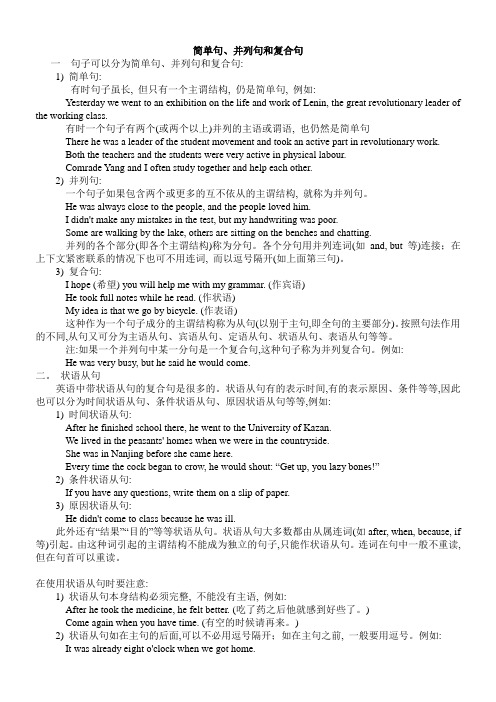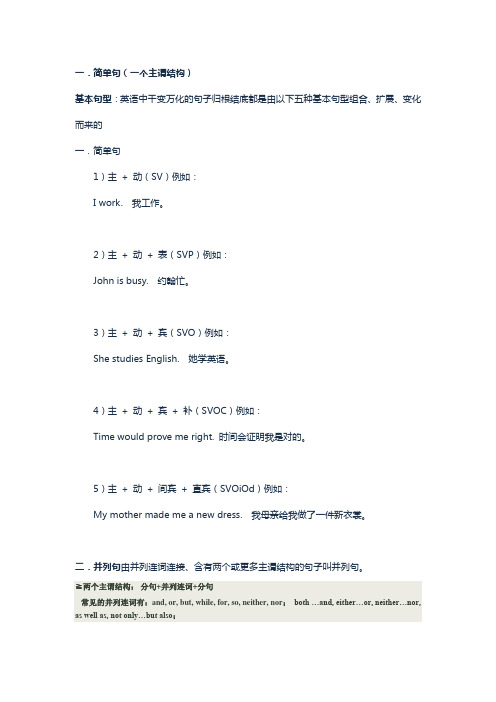简单句和并列句
简单句和并列句(二)

比较: 比较: The river is not safe to swim. The river is not safe to swim in. She is pleasant to talk. She is pleasant to talk with.
3) be + 形容词 + to(to 为介词) to( 为介词) 如:similar, equal, dear, close, respectful, sensitive, true, superior, inferior, loyal, sincere, kind, due, accustomed, subject… He is blind to his own mistake. She is indifferent to such trifles. He is opposed to the plan.
方式状语: 方式状语: He faces the accident calmly. She entered the room nervously. He did the work in a casual way. He cooked in the English style. He posted the letter air mail. They dressed the boy cowboy style.
4) be + 形容词 + at clever, pleased, no good, good, surprised, brilliant, better, astonished, puzzled, angry, bad, delighted. He is not expert at English. I am disgusted at his words. She is alarmed at the sound.
简单句,并列句,复合句

简单句、并列句和复合句一句子可以分为简单句、并列句和复合句:1) 简单句:有时句子虽长, 但只有一个主谓结构, 仍是简单句, 例如:Yesterday we went to an exhibition on the life and work of Lenin, the great revolutionary leader of the working class.有时一个句子有两个(或两个以上)并列的主语或谓语, 也仍然是简单句There he was a leader of the student movement and took an active part in revolutionary work.Both the teachers and the students were very active in physical labour.Comrade Yang and I often study together and help each other.2) 并列句:一个句子如果包含两个或更多的互不依从的主谓结构, 就称为并列句。
He was always close to the people, and the people loved him.I didn't make any mistakes in the test, but my handwriting was poor.Some are walking by the lake, others are sitting on the benches and chatting.并列的各个部分(即各个主谓结构)称为分句。
各个分句用并列连词(如and, but 等)连接;在上下文紧密联系的情况下也可不用连词, 而以逗号隔开(如上面第三句)。
3) 复合句:I hope (希望) you will help me with my grammar. (作宾语)He took full notes while he read. (作状语)My idea is that we go by bicycle. (作表语)这种作为一个句子成分的主谓结构称为从句(以别于主句,即全句的主要部分)。
简单句并列句

一.简单句(一个主谓结构)基本句型:英语中千变万化的句子归根结底都是由以下五种基本句型组合、扩展、变化而来的一.简单句1)主+ 动(SV)例如:I work. 我工作。
2)主+ 动+ 表(SVP)例如:John is busy. 约翰忙。
3)主+ 动+ 宾(SVO)例如:She studies English. 她学英语。
4)主+ 动+ 宾+ 补(SVOC)例如:Time would prove me right. 时间会证明我是对的。
5)主+ 动+ 间宾+ 直宾(SVOiOd)例如:My mother made me a new dress. 我母亲给我做了一件新衣裳。
二.并列句由并列连词连接、含有两个或更多主谓结构的句子叫并列句。
≧两个主谓结构:分句+并列连词+分句常见的并列连词有:and, or, but, while, for, so, neither, nor;both …and, either…or, neither…nor, as well as, not only…but also;一、表示转折对比关系的并列连词1. but 但是,可是,而,却连接两个简单句,连接两个并列成分,可以放在一个句子的句首,后面不接逗号。
例:I hope you don't mind me asking, but where did you buy those shoes?2. yet 但是;尽管如此可连接两个句子,用逗号分开,也可在yet前加and,还可以放在一个句子的句首。
例:The car is old, yet it is in good condition. 这辆车旧了,但车况很好。
3. while 而,但是,可是,却while作连词用时,可表示前后鲜明的对比。
例:I love strong tea while my father loves coffee.二、表示因果关系的并列连词1. for 因为由并列连词for引导的分句常置于句子后部,而且常用逗号与前面的分句隔开。
简单句与并列句

简单句与并列句1. 简单句:(1)定义:只有一个主语(或并列主语)和一个谓语(或并列谓语)的句子叫简单句,如:We learn English . 我们学英语。
(一个主语和一个谓语)Both Xiao Zhang and Xiao Wang are from Beijing .小张和小王都是北京人。
(一个并列主语和一个谓语)He once lived and worked here .他曾经在这里居住和工作过。
(一个主语和一个并列谓语)My father and mother go to work at seven in the morning and come back home at eight in the evening .我父母早上七点上班,晚上八点回家。
(一个并列主语和一个并列谓语)(2)分类:上次我们对简单句按照句子基本结构分出的5种类型做了阐述;另外,根据句子的功能或使用目的,简单句可分四类:陈述句、疑问句、祈使句、感叹句。
2. 并列句:(1)定义:用并列连接词连接起来的两个或两个以上简单句叫做并列句。
(2)并列句的构成:简单句+连接词+简单句(3)连接并列句常用的连接词:and , but , or , so , not only … but also , however , neither…nor , either…or , still等。
eg.I help her and she helps me . 我帮她,她帮我。
He is very old but he is in good health . 他年纪很大了,但他身体很好。
We must hurry or we’ll be late . 我们得赶快走,不然就晚了。
This girl did her work carefully , so she never made any mistakes .这个姑娘工作认真,从不出差错。
简单句与并列句

很多人去过那儿。
7. 由“a pair (a kind, a series…) + of + 复数名词” 作主语时,谓语动词用单数形式;“pairs (kinds…) + of + 复数名词”作主语时,谓语 动词用复数形式。如:
表示连接两个同等概 念,常用and, not
only…but also…, neither…nor…, then等 连接。
1.My name is Tom, and my brother’s name is Jack.
2.Not only is he interested in biology, but also his children begin to show interest in it.
【强化练习】
I. 单项选择 1. She had just finished her homework ___A____ her
mother asked her to practice playing the piano yesterday. (2009年福建)
A. when B. while
C. after
+ A number of trees are cut down. 许多树木被砍倒了。
+ The number of students in our class is 32. 我们班学生人数为32.
6. “a lot of (lots of, plenty of, a pile of, piles of, most of) + 名词”和“分数或百分数 + 名词” 等作主语时,谓语动词的单复数形式取决 于名词,如果是不可数名词,则谓语动词 用单数形式;如果是可数名词复数,则谓 语动词用复数形式。如:
简单句和并列句

@《创新设计》
5.主语+谓语(及物动词)+宾语+宾语补足语 (1)宾语补足语是用来补充说明宾语的情况的,直接跟在宾语之后。 (2)作宾语补足语的主要是名词、形容词、不定式和分词,副词和介词短语等也可 以用作宾语补足语。 ①要跟名词或形容词作宾语补足语的及物动词有:call,consider,choose,elect, feel,find,get,keep,make,name,paint,push,set,suppose,think,turn等。 ②动词不定式作宾语补足语的三种情况 ·要跟带to的不定式作宾语补足语的及物动词有:ask,expect,force,get,order, permit,persuade,tell,want,warn等。
7
@《创新设计》
·要跟不带to的不定式作宾补的动词有have,make,let,listen to,hear,notice,see, watch,feel ·动词help后作宾补的不定式可以带to,也可以不带to。 I would like you to join our school’s table tennis team. 我想让你加入我们学校的乒乓球队。 Your contribution will certainly make the event a huge success. 你的贡献将会使得这次活动获得巨大成功。 In fact,he inspires me to major in English in college. 事实上,他鼓励我在大学主修英语。
4
@《创新设计》
(2)表语多为形容词,也可以是名词、介词短语、不定式及分词等。 Tang Poetry is what we are going to learn the next class,scheduled on July 20 in the school library. 唐诗是我们下一节课将要学习的内容,定于7月20日在学校图书馆进行。 This is surely a good chance for more people to see them. 对于更多的人来说这确实是观看它们的一次好机会。 The “Foreign Cultures” section in our newspaper is very popular among us students. 我们报纸的“外国文化”栏目非常受我们学生的欢迎。
简单句和并列句

句子的种类第一节简单句一、简单句(Simple Sentences)的定义只有一个主语(或并列主语)和一个谓语(或并列谓语)的句子叫做简单句。
He learns German.他学德语。
(一个主语和一个谓语)Both Tom and Jack enjoy country music.汤姆和杰克都喜欢乡村音乐。
(一个并列主语和一个谓语)We sang and danced yesterday evening.昨天晚上我们唱歌跳舞。
(一个主语和一个并列调语)My brother and I go to school at half past seven in the morning and back home at seven in the evening.我和哥哥早上7:30去上学,晚上7:00回家。
(一个并列主语和一个并列谓语)二、简单句的种类(-)根据句子的基本结构分根据句子的基本结构简单句分为5种句型1.主语十连系动词十表语The weather is very cold.天气很冷。
She felt happy她感到很愉快。
Please keep silent!请安静!My father is a physics teacher.我父亲是一个物理老师。
The Lijiang River looks especially beautiful in the early morning. 漓江在清晨看上去格外美丽。
2.主语十不及物动词Winter is coming.冬天来了。
His father has gone abroad.他父亲出国了。
The baby is crying in the next room.婴儿在隔壁房间里哭。
He works in a big company.他在一家大公司工作。
We have lived in the city for ten years.我们在这座城市已生活了10年。
简单句及并列句和复合句

一.五种简单句1.主语+不及物动词(主+谓)He laughed.2.主语+及物动词+宾语(主+谓+宾)I like Chinese food.3..主语+及物动词+间接宾语+直接宾语(主+谓+宾1+宾2)She taught them physics.4.主语+及物动词+宾语+宾语补足语(主+谓+宾+宾补)We must keep the room warm.5. 主语+连系动词+表语(主+系+表)The weather is very cold.二.并列句He is a worker and I am a worker, too.He is very happy but his mother is very sad.上述两句地位一样,如同湖北的省长和湖南的省长一样,地位相等,称为并列句。
三.主从复合句If you are free, we will go to Beijing to play.前者地位低,为后面的主句服务,叫从句。
后者地位高,为主句。
两句合二为一,为主从复合句。
问题:主句与从句怎么辨别?四.从句种类很多。
句子成分划分:主语,谓语,宾语,定语,状语,补语,表语,同位语。
(8种)(主语从句,宾语从句,表语从句,同位语从句)-----名词性从句(定语从句)------形容词性从句(状语从句)------副词性从句Whether we will go shopping depends on the weather.( )He said that he wanted to go to town. ( )That is what I wanted. ( )Y ou are the man who I am looking for. ( )I will help you although I am not very rich. ( )The news that Mr.Li will be our new English teacher is true. ( )。
- 1、下载文档前请自行甄别文档内容的完整性,平台不提供额外的编辑、内容补充、找答案等附加服务。
- 2、"仅部分预览"的文档,不可在线预览部分如存在完整性等问题,可反馈申请退款(可完整预览的文档不适用该条件!)。
- 3、如文档侵犯您的权益,请联系客服反馈,我们会尽快为您处理(人工客服工作时间:9:00-18:30)。
简单句和并列句一.简单句的定义只有一个主语(或并列主语)和一个谓语(或并列谓语)的句子叫简单句。
它起着下述四种作用中的一种:(1)作一种陈述;(2)提出一个问题;(3)发出一种命令或请求;(4)表示一种感叹;如: Mr. Brown teaches this class. (布朗先生教这个班。
) (陈述)Do you understand me?(你理解我的意思吗?) (提问)Open the door.(开门) (命令)What a lovely day it is.(多么好的天气啊!) (感叹)二.简单句的分类:(一)根据句子的基本结构简单句可分为5种基本句型。
1.主语+连系动词+表语如:The weather is cold. (天气很冷。
)The plant seems dead.(那植物好象死了。
)The child soon fell asleep.(那孩子很快睡着了。
)Roses smells sweet.(玫瑰花有香味。
)注意:1.常见的连系动词有:be(am; is; are/ was; were); smell;(闻起来) sound;(听起来); look(看起来)seem; (看起来)appear;(看起来);keep;(保持;keep fit;(保持健康)) stay;(保持);stay clean;(保持干净);remain;(保持);remain calm;(保持镇静)go;(变得);go wrong;出毛病) get; (变得);get angry;(生气)become; grow;(变成);grow dark;(变黑) feel;(摸起来) turn; 变得);turn green; (变绿)prove;(被证明)His theory proves true.他的理论被证明是真的。
) come;(成为)His dreams come true.他的梦想成真。
);fall(变成);he fell ill. 他病了。
)2. 表语可以是形容词、代词、分词、介词短语等。
2.主语+不及物动词如:The little boy smiled.(男孩笑了。
)His father is reading in the next room.(他爸爸在隔壁读书。
)She works in No. 14 middle school.(他在14中工作。
)Prices goes up again. (物价又上涨了。
)注意:谓语可以是成语动词,甚至有它的修饰语如:状语3.主语+及物动词+宾语如:Mary loves China.(玛丽爱中国。
)Everybody made fun of him.(人人都笑他。
)She only wants one.(她只想要一个。
)He began leaning English at five.(他5岁开始学英语。
)She didn’t know what to do then.(她不知道接下来该怎么办。
) 注意:在这种句型中带宾语的动词多为及物动词,也可以是成语动词,即动词和介词或副词构成的短语。
4.主语+及物动词+间接宾语+直接宾语如:My grandma told me a story.(我祖母给我讲了个故事。
)Mr. Wang taught us English.(王先生教我们英语。
)He bought a English-Chinese dictionary.(他给我买了一本英汉词典。
)The teacher is showing us how to operate computers.(老师正教我们怎样使用电脑。
)注意:这种跟两个宾语的动词称为双宾动词,间接宾语在前,直接宾语在后。
有时直接宾语可以放到后面,但前面要加上介词to或for.如:He bought an English-Chinese dictionary for me.The teacher is showing how to operate computers to us.5.主语+及物动词+宾语+宾语补足语如:The news made us surprised.( 这消息使我们很吃惊。
)The boss made him work day and night.(老板使他日夜工作。
)When she came in she found the cat dead.(他进来时发现猫死了。
)They elected Bush president of the US.(他们选布什为总统)注意:宾语补足语是用来补充说明宾语怎么样,做什么的。
充当宾补的可以是形容词、动词不定式、过去分词、动词ing形式、名词、介词短语等。
并列句一.并列句的定义含有两个或两个以上的独立主谓结构或简单句的句子,叫做并列句。
各分句靠连词、逗号或分号连接。
二.并列句的结构分句+连词+分句三.并列句中的并列连词1.表示并列关系的连词and, both---and---, not only---but (also)---, as well as,如:Work hard and you will pass the exam.(努力学习吧,你会通过考试的。
)Not only did the restaurant overcharged me , but they hadn’t served me well.(餐馆不仅要价太高,而且对我的服务也不周到。
)He often goes to the museum as well as ( he often goes ) to the concert.(他经常去博物馆,也常去音乐会。
)表示转折关系的连词but, still, while(表示一种对比,作“而”,“却”解), however, yet,when(所连接的分句必须放在后面,意思是:正在那时(=just at that time),表示一个事情过程中出现了意想不到的意外情况。
)如:It’s very good, yet it can be better.(这很好,但还能精益求精。
) One can’t see wind, however, it does exist.(人们看不见风,可是它的确存在。
) He failed many times, but he didn’t despair.(他失败多次,但并没有气馁。
) Some experiments are difficult while others are easy.(有些实验是困难的,而其他的则很容易。
)She is seriously ill, still there is hope of her recovery.(她病得很重,然而仍有希望康复。
)I was wandering around the street when I caught sight of a tailor’s shop.(我正在街上闲逛这时我看见了一家裁缝店)3.表示选择关系or, or else, otherwise, either---or, neither--- or--- (either---or,neither---nor---的谓语动词与后一主语保持一致。
)如:Take the chance, or/ or else/ otherwise you’ll regret it.(抓住这次机会,否则你会后悔的)Either you or I am wrong.(不是你错了,就是我错了。
)Neither has he changed his mind, nor will he do so.(他既没有改变主意,也不打算这样做。
)4.表示因果关系for(引导的分句只能置于句末,而且用逗号和前面的分句隔开。
for 引导的句子主要是对前面分句补充说明理由或推断原因。
) , so, therefore(因此/所以)等如:The day has broken, for the birds are singing.(天亮了,因为鸟在叫。
)He failed in the exam, so he was unhappy these days.(他考试没及格,所以他这些天总是闷闷不乐的。
)注意:并列连词不能与从属连词混合使用误: Although he was sick, but he went on working.正: Although he was sick, he went on working.He was sick, but he went on working.He was sick, and yet he went on working.Although he was sick, yet he went on working.翻译下列句子:1.高考前同学们常常学习到深夜._______________________________________________________________________________ 2.我等你等了很久了._______________________________________________________________________________ 3.玻璃很容易碎.______________________________________________________________________________ 4.她听了这消息好象很平静.______________________________________________________________________________ 5.他太累了,刚躺下就睡着了.______________________________________________________________________________ 6.这家工厂没周生产一千辆小汽车.______________________________________________________________________________ 7.请你把那本书递给我好吗?______________________________________________________________________________ 8.我去找个人来帮你修理电脑._____________________________________________________________________________ 9.我们感到我们的心在激烈的跳动._____________________________________________________________________________ 10.有很多中国学生在国外留学.____________________________________________________________________________单项选择:1.Follow your doctor's advice,_______ your cough will get worse.(辽宁2005)A.or B.and C.then D.So2.—Somebody wants you on the telephone.—____ no one knows I’m here. 北京2005A. ForB. AndC. ButD. So3.They wanted to charge $ 5, 000 for the car ,____ we managed to bring the price down .(全国卷2006)A.but B.so C.when D.since4.Progress so far has been very good. _______, we are sure that the project will be completed on time. (浙江2006)A. HoweverB. OtherwiseC. ThereforeD. Besides5.The cost of living in Glasgow is among the lowest in Britain, ____ the quality of life is probably one of the highest. (天津2006)A. sinceB. whenC. asD. while6.There are many kinds of sports, ______ my favourite is swimming.(辽宁2004)A. asB. thenC. soD. but –7. Paul had to write a history paper,______ he couldn’t find time to do it. (全国卷2004)A. butB.soC. becauseD.if8.I do every single bit of housework_____ my husband Bob just does the dishes now and then. (全国卷2004)A. sinceB. whileC. whenD. as9.The shop doesn’t open until 11 a.m, _____ it loses a lot of business. (北京2004春季)A. forB. orC. butD. so---10.Excuse me for breaking in, ______ I have some news for you.(全国卷2002)A. soB. andC. butD. yet11.---Would you like to come to the dinner party here on Saturday?---Thank you. _________I’ll be out of town at the weekend. (北京2002)A. becauseB. andC. soD. But12.Lose one hour in the morning ______you will be looking for it the rest of the day. (北京2005春季)A. butB. andC. orD. so13. ---I think George doesn’t really care for TV plays.---Right,____he still watches the program. (重庆2004)A. andB. butC. orD. so14. My name is Robert,_______ most of my friend call me Bob for short. (上海1997)A. then b. instead C. however D. but15.We are going to the booksrore in John’s car. You can come with us _____ you can meet us there later. (全国卷2003)A. butB. andC. orD. then16. They were surprised that a child should work out the problem______ they themselves couldn’t.( 上海1996)A. onceB. themC. whileD. if17. I hope you don’t mind me asking, _____ where did you buy those shoes? (全国卷2002)A. soB. andC. yetD. But18. Don’t be discouraged. _____ things as they are and you will enjoy every day of your life.(上海2003春季)A. TakingB. To takeC. TakeD. Taken。
